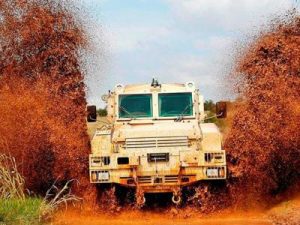South Africa is experiencing a significant upswing in its arms exports during the first half of 2023, setting the stage for potentially surpassing the previous year’s totals. If current trends persist, the nation is on course to export substantially more military hardware and munitions this year than it did in 2022, as the first six months of 2023 are already approaching the total for the entire previous year.
In the first half of 2023 alone, the National Conventional Arms Control Committee (NCACC) gave the green light to exports valued at R3.8 billion for munitions, a substantial increase from the R1.4 billion approved during the same period in 2022.
This growth in exports follows a trend that saw South Africa exporting R4.679 billion worth of military hardware and munitions throughout the entirety of 2022, a notable increase from the R3.353 billion recorded in the preceding year.
Advocate Ezra Jele, the Head of the NCACC Secretariat, presented these figures to Parliament’s Joint Standing Committee on Defence during a briefing on first and second-quarter imports and exports, held on 7th September. His data showed that during the first quarter of 2023, the NCACC issued 128 munitions export permits to 34 countries, valued at R957 million. Additionally, 28 dual-use goods permits were granted to 14 countries, amounting to R108 million.
For the second quarter of 2023, the NCACC approved 136 munitions export permits to 17 countries, worth a substantial R2.8 billion. In addition, 39 dual-use technology exports were authorized, totaling R229 million and involving 14 countries.
Regarding imports, the first quarter of 2023 saw the NCACC granting 49 import permits worth R5 million, involving 14 countries. The second quarter included 69 import permits from 25 countries, valued at R400,000, according to a recent report by defenceWeb.
While Advocate Jele did not provide a detailed breakdown of the 2023 export permits, it is likely that ammunition constituted a significant portion, along with electronic systems. This aligns with the composition of exports in the 2022 calendar year, which were predominantly ammunition (R1.6 billion), bombs and rockets (R946 million), and electronic equipment (R1.3 billion).
The surge in export sales during the initial two quarters of 2023 is likely a consequence of the worldwide increase in military spending, particularly in the wake of Russia’s invasion of Ukraine in February 2022. The Stockholm International Peace Research Institute (SIPRI) reported that global military expenditure continued to rise, reaching a new high of $2,240 billion. A growing trend is that clients are moving away from straight purchases, and co-development, co-marketing, co-production are key going forward, as strategic partnerships are crucial.
Dr. Nan Tian, Senior Researcher with SIPRI’s Military Expenditure and Arms Production Programme, commented, “The continuous rise in global military expenditure in recent years is a sign that we are living in an increasingly insecure world. States are bolstering military strength in response to a deteriorating security environment, which they do not foresee improving in the near future.” South Africa’s increasing arms exports reflect this broader trend in military expenditure worldwide.
Meanwhile, the South African defence industry experienced notable growth in recent years, with 2022 being a particularly significant year for the sector. This growth can be attributed to various factors, including increased defence spending, enhanced local manufacturing capabilities, and a focus on innovation and technology. The expansion of the defence industry in South Africa has not only had economic benefits but has also contributed to the country’s national security and defence capabilities.
Although, a lack of strong government support has had a negative impact on South Africa’s once-strong domestic defence industry for a long time, and this situation continues to fuel export sales to its international customers which include Germany, Turkey, Kuwait, the Philippines, UAE, and Zambia.
Arms sales bureaucracy is a major cause that delays the export of South Africa’s weaponry pending when export permits are issued. For instance, the delays to approve Turkey and Poland’s export permits may be linked to fears that the weaponry and components will be diverted to Ukraine. This has put R2.85 billion in weapons sales on hold.
This development highlights the damaging effects of the slow pace of export permit processing on the floundering South African defence industry. The National Conventional Arms Control Committee (NCACC) which handles these process have been criticized by industry practitioners for being slow in their operating procedures.
In 2021, the South African defence industry exported R3.353 billion worth of weapons, ammunition and military equipment to 67 countries around the world.
In 2020, arms exports for South Africa were 37 million US dollars. Though South Africa’s arms exports fluctuated substantially in recent years, they tended to increase through the 1960 – 2020 period ending at 37 million US dollars in 2020.
In addition to supplying things like armoured vehicles, missiles, simulators, UAVs and aircraft components and upgrades to the South African National Defence Force (SANDF), the SA defence industry has supplied products and services to nearly three dozen countries, including artillery systems, armoured vehicles, electronic warfare systems, Mi-24 upgrades, Seeker UAVs, missiles, training systems and more.
